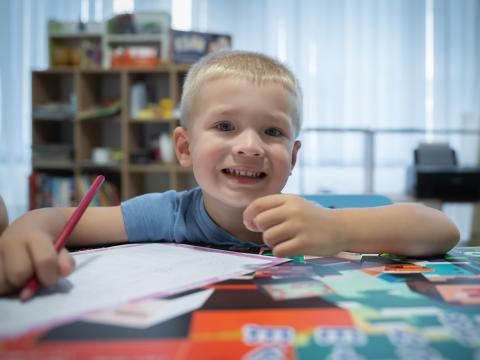Two years on, the Ukrainian children’s right to education continue to face mounting threats and challenges

Kyiv, Ukraine – “We go to school to learn, so when we grow up, we will be smart”, Vasilysa declared with infectious hope.
As the war continues in Ukraine, Vasilysa is among the 5.3 million children in Ukraine whose educational opportunities are under threat, along with the 3.6 million affected by the school closures, and an estimated 480,000 children with disability and special needs, according to a UNICEF report.
“The challenge for all of us is to protect and uphold the Ukrainian children’s right to education despite the uncertain times. The barriers should not stop us. As leaders and humanitarians, even as parents ourselves, we are duty-bound to make sure this right is upheld and supported to the best we can”, said Chris Palusky, World Vision’s Ukraine Crisis Response Director.
Since the start of the war, at least 363 kindergartens and schools were destroyed and 2,246 damaged in Ukraine, likely increasing over the period. Despite the facilities and online platforms being provided, Ukraine’s Ministry of Education and Science (MOES) reported that millions are faced with the difficulty of studying through mobile phones, significantly decreasing the quality of learning and lack of connectivity, hence missing important sessions.
World Vision’s education in emergencies and other sectoral programs have supported over 726,000 Ukrainian children in Ukraine, Romania, Moldova, and Georgia. The educational activities in Ukraine that include summer camps, provision of school supplies, language classes, mental health and protection activities have supported over 221,000 children.
Over 1,500 teachers and educators were trained on enhanced skills on protection, stress management and psychosocial support to boost their capacity to deal and assist with the challenging circumstances. Local partners on the ground play a crucial role in ensuring these programs are in place and well utilized to reach out to as many children as possible, especially in the most critical areas.
The curriculum app on math and literacy developed with War Child for primary school children in Ukraine has been downloaded and used by at least 40,000 users. World Vision continues to work closely with the MOE, the Local Education Authority, the education cluster, and local education partners at national and regional level contributing actively to the development of the Education Cluster National Strategy 2024.
The challenge for all of us is to protect and uphold the Ukrainian children’s right to education despite the uncertain times. The barriers should not stop us. As leaders and humanitarians, even as parents ourselves, we are duty-bound to make sure this right is upheld and supported to the best we can.
In Moldova, World Vision has been supporting the educational needs of Ukrainian children and local schools, as well as access to online learning in most of the 32 districts across the country. These educational projects integrated with child protection, mental health and psycho-social support reached out to 8,656 children.
Palusky added, “We can only emphasize and remind that the need is still great. Millions of Ukrainian children are suffering, and the bright future they deserve are at stake. The call for more support should be stronger, louder and urgent, as the war closes in on its second year. This year's theme calling on for "learning for lasting peace" is also a call for commitment and action.”
World Vision is closely monitoring the evolving needs and opportunities in education, as part of its focus areas of operations, and is bringing in many of World Vision’s tested strategy and approaches that would help enhance the effectivity of the program.
Catch Up program adapted and being piloted in Ukraine and Moldova, conducting the literacy and numeracy skills assessment for the displaced and returnees’ children who has lost learning time due to displacement.
EIE and protracted crisis Approach using formal and non-formal education to create access to quality education for both refugees, internally-displaced and host community children. This includes summer camp, afterschool activities, child-friendly spaces and integrating to host community schools.
Impact + is a global center IMPACT + program being integrated in the Ukraine and Moldova context to support adolescent boys and girls through language, basic communication and life skills and soft skills training. It will also be merged with cash assistance and livelihood programs to create linkage between training and creating income.
Teachers in THE CRISIS context is a global Inter-Agency Network on Education in Emergencies (INEE) approach to support teachers during Crisis. This approach and will continue to support teachers both in Ukraine and Moldova.
Video: Leave no child behind - Ukraine's classrooms are just bricks without children
For media interviews and further queries, contact: Cecil Laguardia, Communications Director